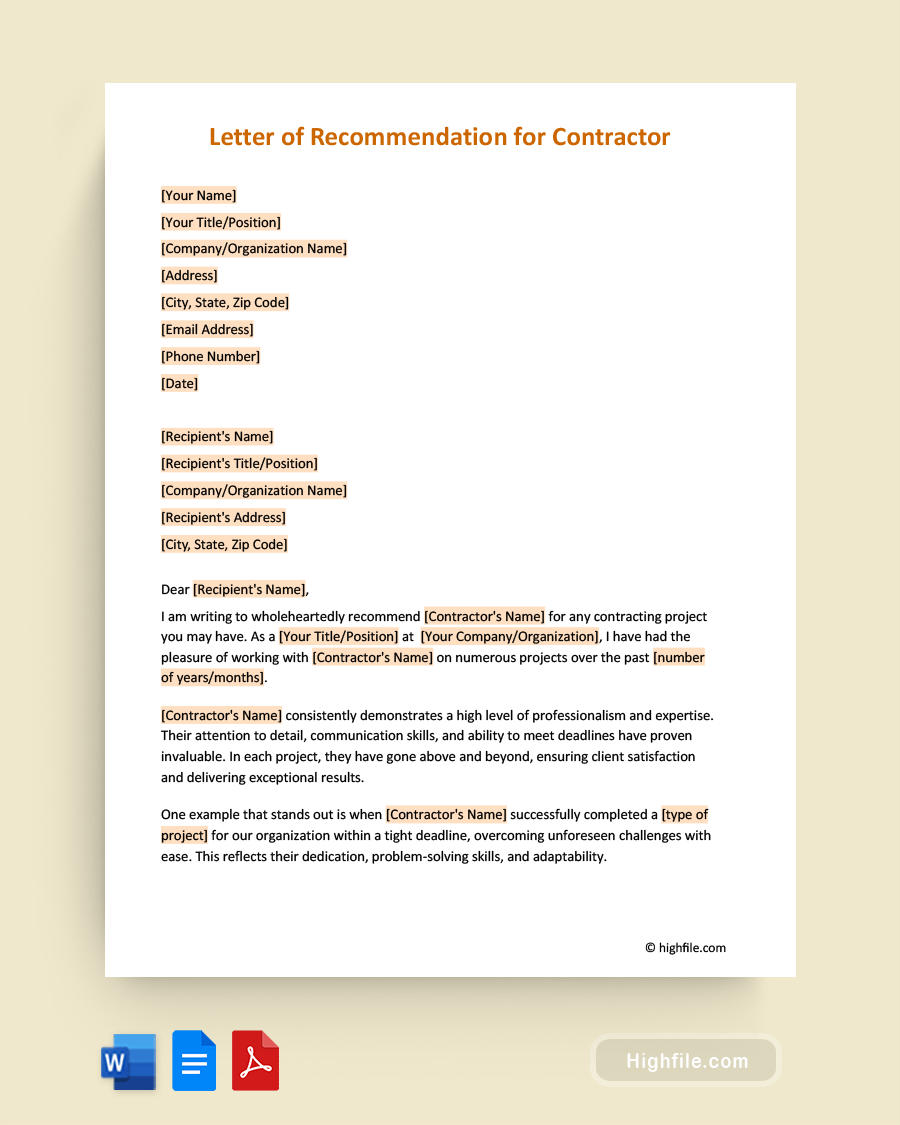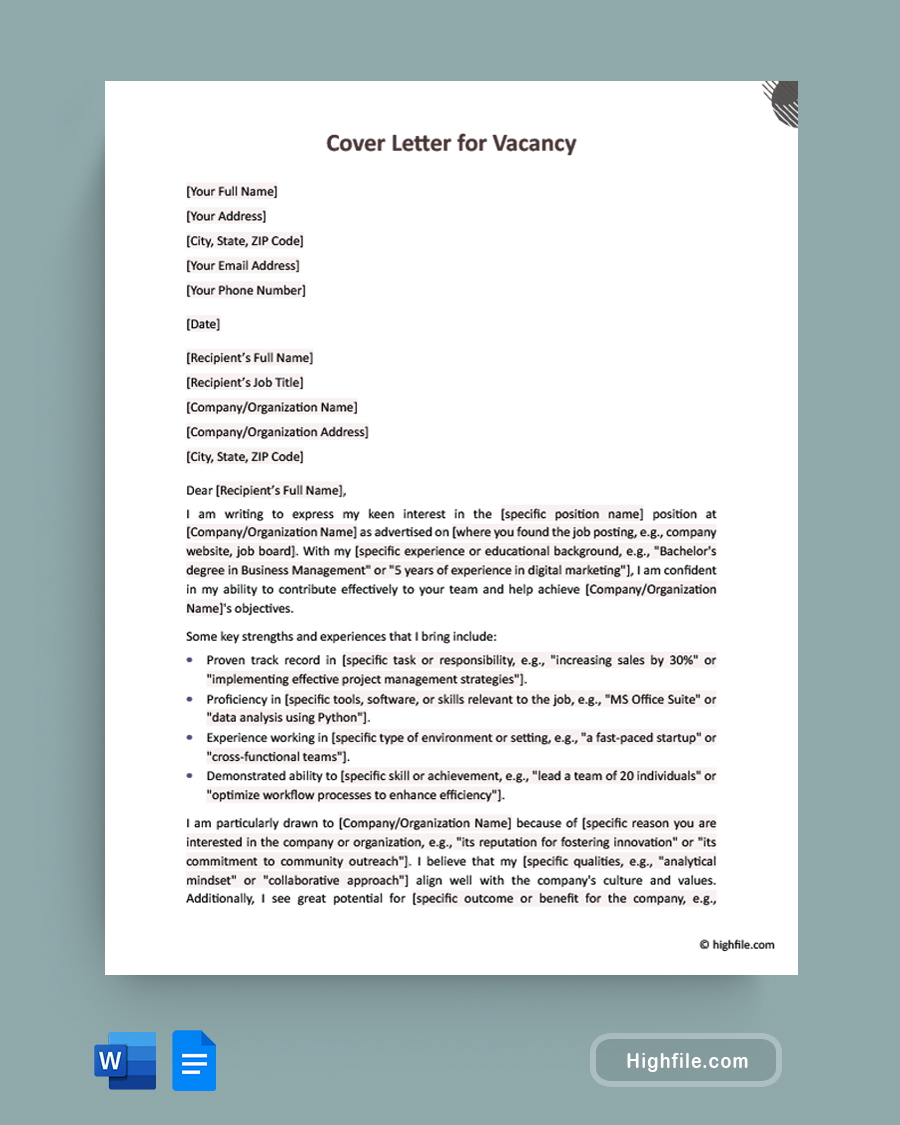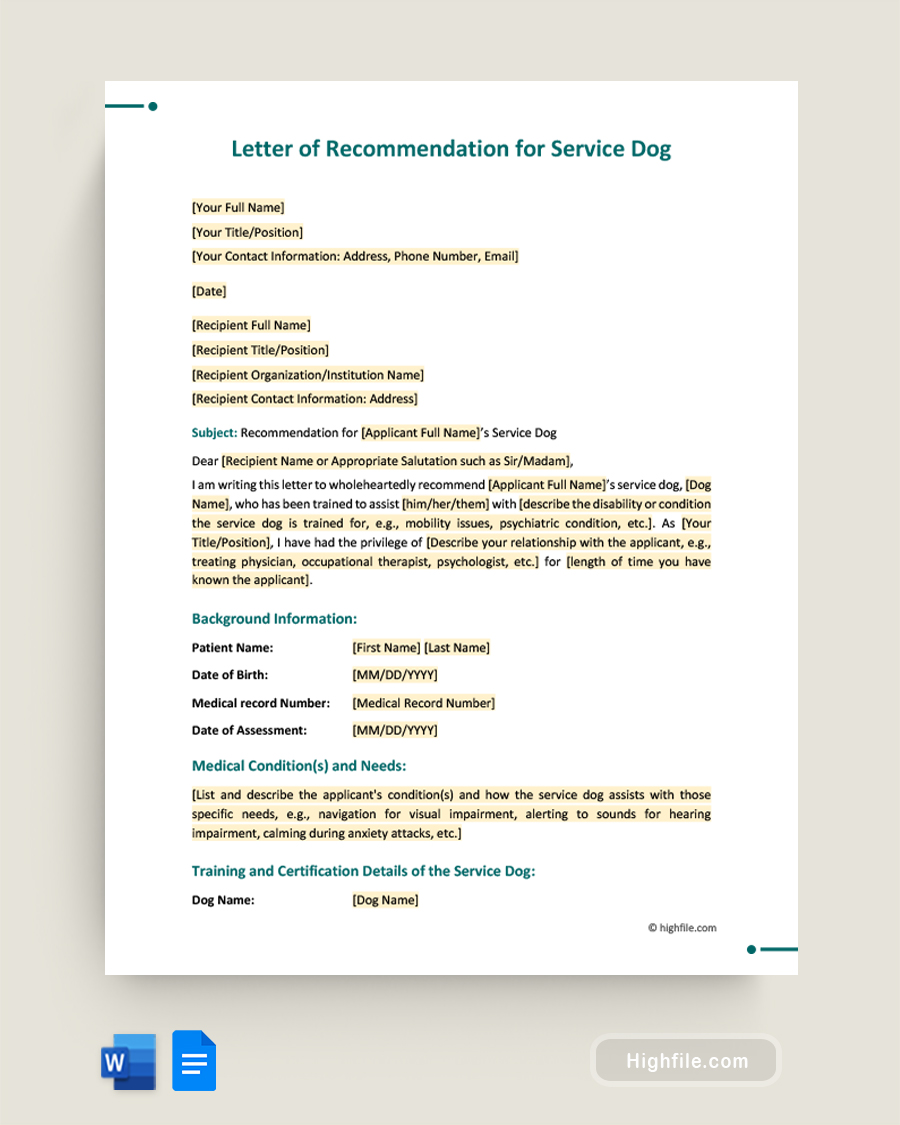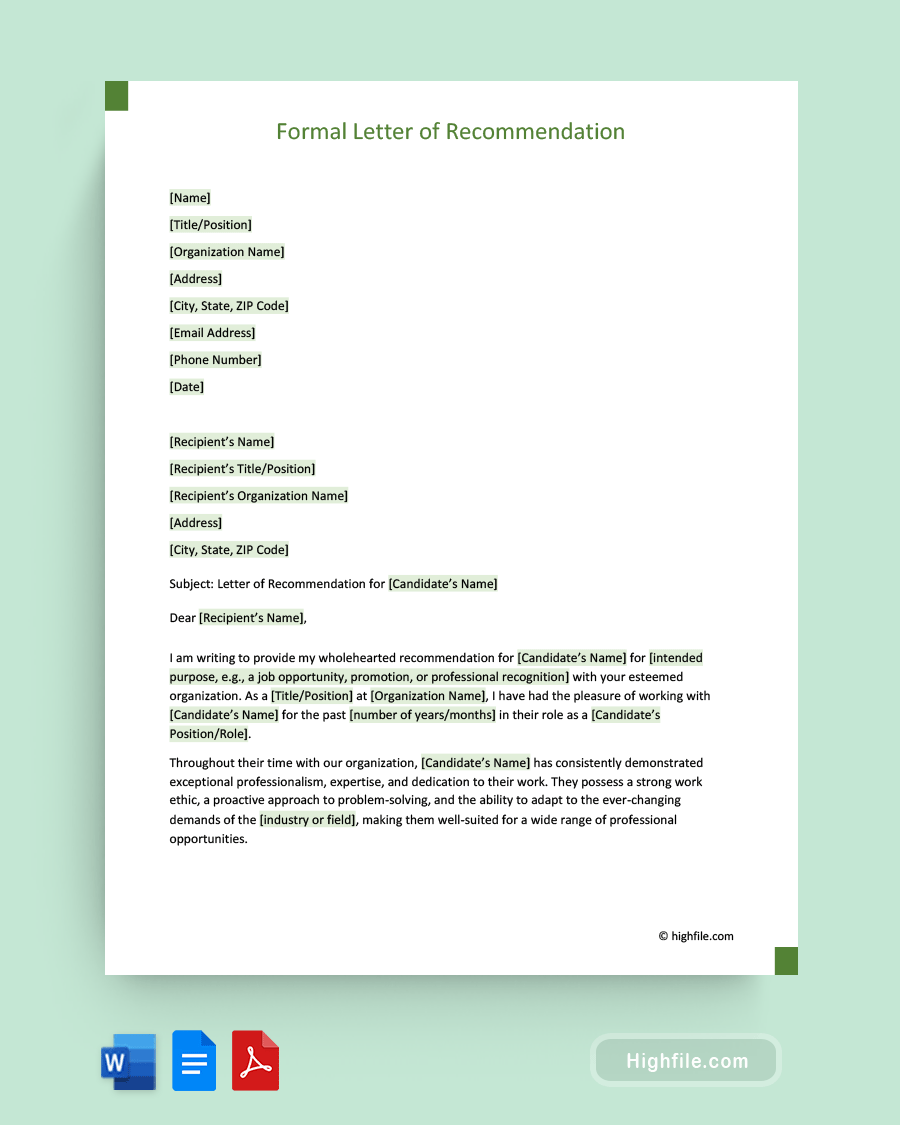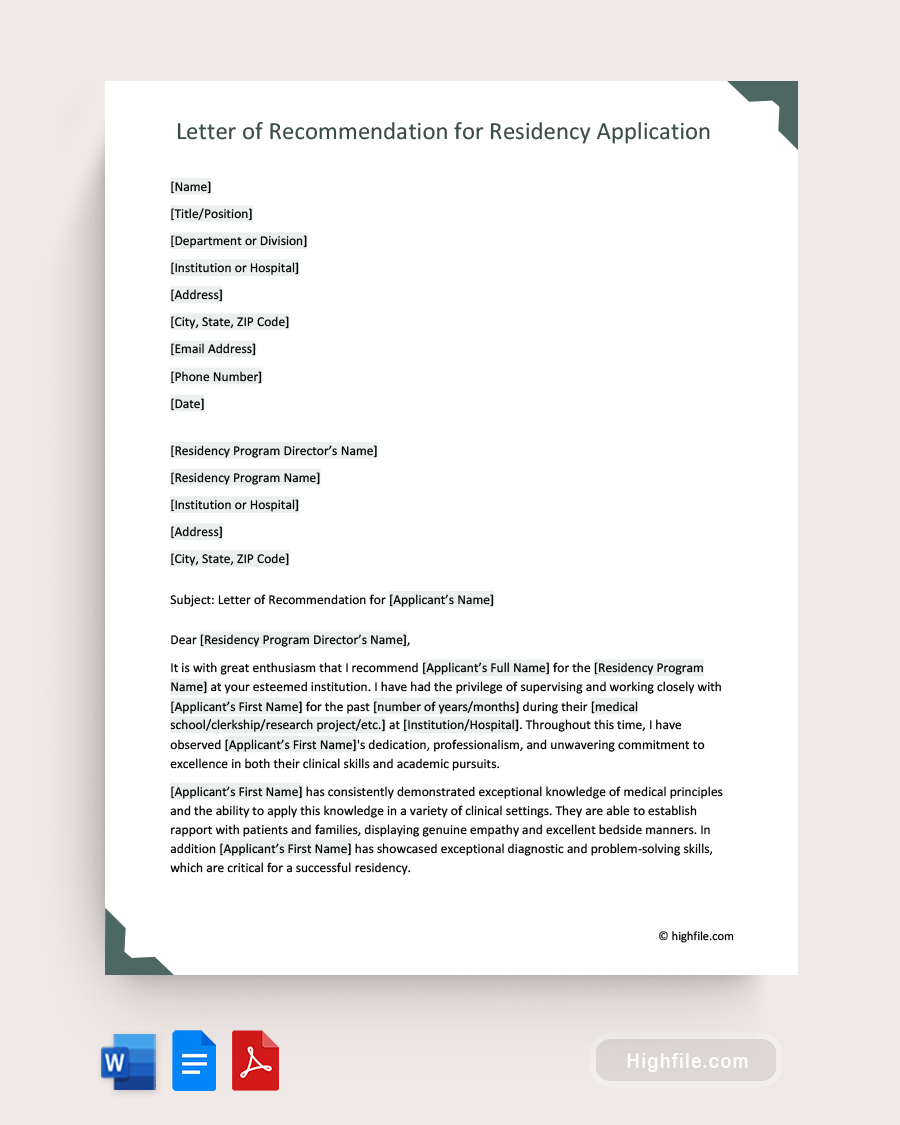A letter of recommendation for a contractor can be an invaluable resource for clients looking to make informed decisions about which contractor to hire. A well-crafted letter can provide clients with insights into the contractor’s skills, experience, and working style, helping them to evaluate whether the contractor is a good fit for their needs. A high-quality endorsement can provide clients with valuable insights and help them to make informed decisions about their projects. A template can help the writer create a clear, effective letter showcasing the contractor’s strengths and expertise.
What Is a Letter of Recommendation for a Contractor?
A letter of recommendation for a contractor is a document written by a client or business partner who has worked with the contractor and can attest to their skills, professionalism, and quality of work. The endorsement aims to positively endorse the contractor and help them secure future contracts or business opportunities. In the letter, the writer typically provides specific examples of projects the contractor has completed and highlights their strengths and areas of expertise. They may also discuss the contractor’s communication skills, reliability, and ability to work well with clients and other project team members.
Fun Fact: A single well-thought-out letter of recommendation can have a major impact on a contractor’s business. It can cause a cascade effect that propels the business forward, leading to more clients.
Why Is a Letter of Recommendation for a Contractor Important?
A letter of recommendation for a contractor is an important document for several reasons, including:
- Provides evidence of the contractor’s skills and expertise: A strong letter of recommendation can showcase the contractor’s abilities and prove their expertise in their field.
- Establishes credibility and reputation: A positive endorsement from a satisfied client or business partner can help to establish the contractor’s credibility and reputation in the industry.
- Differentiates the contractor from competitors: A well-written letter of recommendation can set the contractor apart from their competitors and help them to secure future contracts or business opportunities.
- Builds trust with potential clients: When potential clients see that the contractor has received positive feedback from previous clients, they are more likely to trust the contractor and feel confident in their abilities.
- Provides a competitive advantage: A strong letter of recommendation can give the contractor a competitive advantage over other contractors who may not have such endorsements.
Important Note: A letter of recommendation for a contractor should have specific examples, such as anecdotes, rather than more generic statements. Incorporating this into the letter will help the contractor be more memorable among a pool of applicants and lend credence to your endorsement.
Essential Elements of Letter of Recommendation for Contractor
The essential elements of a letter of recommendation for a contractor include an honest assessment of their skills and abilities, among other vital information. Here is what your letter should contain:
- Contact information:
- Your name
- Your title/position
- Your organization (if applicable)
- Your phone number
- Your email address
- Recipient contact information:
- Name and title of the recipient
- Organization (if applicable)
- Address
- Formal Salutation: When possible, address the recipient by name, “Dear John Doe.” Remember to maintain a professional tone throughout this document.
- Introduction: Start with an introduction that explains your relationship with the contractor and how long you’ve worked with them.
- Scope of work: Provide details about the type of work the contractor did for you, including the scope and duration of the project.
- Skills and expertise: Highlight the contractor’s skills, expertise, and qualifications that made them stand out.
- Quality of work: Comment on the quality of work the contractor provided, including their attention to detail, ability to meet deadlines, and overall workmanship.
- Communication and professionalism: Discuss the contractor’s communication skills and professionalism, including their ability to work with clients and respond to concerns or issues.
- Dependability and reliability: Emphasize the contractor’s trustworthiness and reliability, including their ability to show up on time, complete work on schedule, and follow through on commitments.
- Character and personality: Comment on the contractor’s character and personality, including their work ethic, attitude, and ability to work well with others.
- Overall recommendation: Summarize your thoughts on the contractor and provide an explicit endorsement, indicating whether you would hire them again or refer them to others.
- Contact information: Include your contact information in case the reader has any additional questions or wants to follow up with you.
Pro Tip: When composing this type of endorsement, it is vital to ensure the information is positive, up-to-date, and relevant, as outdated or negative information can impact the contractor’s reputation. Moreover, you should also avoid exaggerating or making false claims. Stick to the facts and avoid exaggerating the contractor’s skills, qualifications, or work. Making false claims can undermine your credibility and harm the contractor’s reputation in the long run.
FAQs
To identify potential recommenders who can provide impactful letters of recommendation, contractors should consider individuals who have worked closely with them and can attest to their skills and expertise. They should also select recommenders who are respected and credible in the industry. When approaching potential recommenders, contractors should be professional, explain the recommendation letter’s purpose, and provide relevant information about the project or work. By taking these steps, contractors can identify and approach potential recommenders who can offer compelling recommendations.
If a client is willing to provide a recommendation but may not have strong writing skills or industry knowledge, a contractor should offer to assist in the drafting of the recommendation letter. Contractors should work closely with the client to ensure that the recommendation letter accurately reflects the contractor’s skills and expertise while addressing any specific job or project requirements. By taking a collaborative approach, contractors can ensure that the recommendation letter is effective and informational while supporting their clients in providing a valuable endorsement.
To address potential biases or perceptions of favoritism in recommendation letters, contractors should highlight specific skills, accomplishments, and results achieved by the contractor. They should avoid using subjective or overly casual language and instead provide concrete examples of the contractor’s work and performance. Additionally, they should seek recommendations from diverse sources, including past clients, colleagues, and industry experts, to provide a more well-rounded view of the contractor’s abilities. Suppose a recommendation letter comes from a personal connection or a long-term client. In that case, contractors can also address potential biases or perceptions of favoritism by providing additional context and background information about the relationship while maintaining a professional and objective tone.
Key Points
A strong letter of recommendation for a contractor can be a valuable asset for the contractor’s business, as it can help to establish their reputation and credibility in the industry and differentiate them from competitors. These endorsements help clients make informed decisions by providing insights into the contractor’s skills, experience, and working style. Using a template can ensure that the letter includes all necessary information, organize thoughts, and save time. Clients can evaluate whether the contractor fits their needs by reading a well-crafted recommendation. Overall, a concise and effective letter highlights the contractor’s strengths and expertise, and it is a valuable resource for building the contractor’s business and establishing its reputation in the industry.
